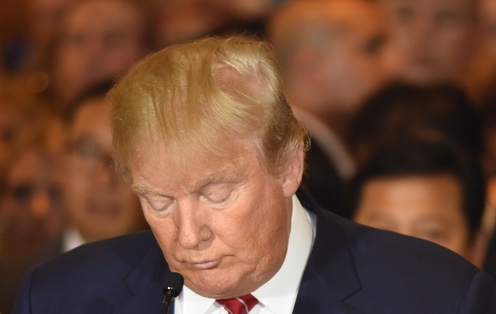What Donald Trump doesn’t know…

When I was six or seven years old I amused my parents (to my bafflement) when I referred to pancakes as my most favorite breakfast in “the whole white world.” Children get their cliches from adults and sometimes they get them imperfectly, at first. Only fully inculturated adults use the cliches of their native languages to their full extent, unless they know better. The literate and the educated are expected to avoid them “like the plague,” as William Safire once put it so humorously. (That cliche ought to lead to the question, what should one avoid the plague like?)
Apart from children, the educated and the foreign born, there’s a fourth category of cliche avoider, the person who seldom reads and seldom pays attention to what others say. This is perhaps the most rare form of cliche avoidance, but also the only instance of that phenomenon that’s also a little scary.
Donald Trump recently tweeted, “I completely read the entire Mueller Report, and do you know what I concluded after reading both Volume 1 and Volume 2? There is no there there. NO THERE THERE!” When I first read that I knew instinctively he was quoting, that he hadn’t written it himself. Why? The most obvious reason was his claim to have read both volumes of the Mueller Report. It isn’t that Trump is a slow reader, Trump simply doesn’t read at all. Of course, he could be lying. But what finally convinced me was the phrase, “no there there.” A cliche, to be sure, though a somewhat literate cliche, if such can be said. It was coined by Gertrude Stein, referring to her childhood in Oakland, California.
Don’t misunderstand me, Donald Trump does resort to cliches. A survey of his tweets reveals the occasional and unavoidable phraseology of the commonplace. But his language is oddly colorless, lacking many of the informal, colloquial idioms we see in everyday speech. He simply doesn’t employ cliches as automatically as most people, not even when being extemporaneous. Think of it yourself, can you imagine Donald Trump saying something like, “ignorance is bliss,” or, “better safe than sorry”? Nor can I. It would seem odd, and it would render him almost … human.
John McWhorter, professor of linguistics at Columbia University explains, “Donald Trump linguistically is unadorned,” and even though he went to the “best schools” he “learned nothing in them. He speaks like someone who paid no attention to one of the goals of education, which is to refine our natural inborn proclivities of speech, which are great for casual circumstances, but he uses those same ways of speaking in what most of us would consider formal or important circumstances.” McWhorter clarifies that, “There’s a high way of talking and a low way of talking.” Trump only uses the low way, even when speaking in highly formal settings. The only exception to this is when he’s reading a speech.
Trump isn’t interested in books and he certainly isn’t interested in what others have to say. Trump’s recent Oval Office audience with Nadia Murad, the Yazidi human rights activist and Nobel Prize winner, was a case in point. After telling Trump that her parents were dead, Trump asked her, “where are they now?” This has widely been misinterpreted as Trump’s lack of human empathy. That is a mistake. Trump’s lack of empathy is demonstrated readily enough by his willingness to cage children and refugees in deplorable circumstances indefinitely without due process, or his indifference to Puerto Rico, an indifference so callous and cruel and so deep and shocking that he actually mocked the way they pronounce the name of their country while he let its citizens die from insufficient federal aid. No, Trump wouldn’t have asked that question of Ms Murad if he’d heard her. The problem wasn’t down to mere lack of empathy, of which Trump has demonstrated innumerable times that he has none, the problem was merely that someone was speaking at the moment, and it wasn’t Donald Trump.
Donald Trump voluntarily remains in the White House for two reasons, for his own glorification and to stay out of prison. He never works, he never reads, he merely shifts blame for his screw ups and takes credit for the efforts of others. He cannot address any topic, no matter how solemn or tragic or profound, without finding a way to return the focus to his overriding favorite subject, himself. He exists for Donald Trump, not you, not me, not the people who adore him. It’s too bad they can’t see him the way we do.

Robert Harrington is an American expat living in Britain. He is a portrait painter.
